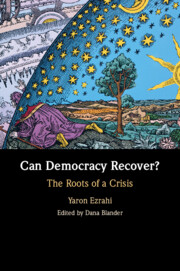Refine search
Actions for selected content:
66 results
51 - The Archaeology of Late Antique Identity
- from Part V - Issues and Debates
-
- Book:
- The Cambridge Encyclopaedia of Late Antique Art and Archaeology
- Published online:
- 04 July 2025
- Print publication:
- 31 July 2025, pp 902-918
-
- Chapter
- Export citation
11 - Key Principles of International Law and Hierarchy of Rights Holding
- from Part IV - Construction of Legitimacy in International Law
-
- Book:
- The Law and Politics of International Legitimacy
- Published online:
- 14 July 2025
- Print publication:
- 24 July 2025, pp 202-225
-
- Chapter
- Export citation
12 - International Legitimacy and Rightful Conduct
- from Part IV - Construction of Legitimacy in International Law
-
- Book:
- The Law and Politics of International Legitimacy
- Published online:
- 14 July 2025
- Print publication:
- 24 July 2025, pp 226-241
-
- Chapter
- Export citation

Iris Murdoch
-
- Published online:
- 07 March 2025
- Print publication:
- 03 April 2025
-
- Element
- Export citation
15 - The Individual’s Relationship with God
- from Part IV - Forms and Functions of Worship
-
-
- Book:
- The Philosophy of Worship
- Published online:
- 09 January 2025
- Print publication:
- 23 January 2025, pp 278-295
-
- Chapter
- Export citation
4 - The Imaginary of the Modern Democratic Individual as a Political Agency
- from Part II - The Emergence of the Epistemological Constitution of Modern Democracy
-
- Book:
- Can Democracy Recover?
- Published online:
- 02 January 2025
- Print publication:
- 16 January 2025, pp 41-56
-
- Chapter
- Export citation
18 - Modern Critics of Democracy
- from Part V - Democracy beyond Modernity
-
- Book:
- Can Democracy Recover?
- Published online:
- 02 January 2025
- Print publication:
- 16 January 2025, pp 180-191
-
- Chapter
- Export citation

Can Democracy Recover?
- The Roots of a Crisis
-
- Published online:
- 02 January 2025
- Print publication:
- 16 January 2025
8 - Improving Population Health
- from Part 1 - The Public Health Toolkit
-
-
- Book:
- Essential Public Health
- Published online:
- 01 December 2023
- Print publication:
- 14 December 2023, pp 145-162
-
- Chapter
- Export citation
Do you see the pattern? Make the most of sensor data in dairy cows
-
- Journal:
- Journal of Dairy Research / Volume 90 / Issue 3 / August 2023
- Published online by Cambridge University Press:
- 02 October 2023, pp. 252-256
- Print publication:
- August 2023
-
- Article
-
- You have access
- Open access
- HTML
- Export citation
Chapter 1 - Introduction
-
- Book:
- Relational Health
- Published online:
- 23 February 2023
- Print publication:
- 02 March 2023, pp 1-19
-
- Chapter
-
- You have access
- HTML
- Export citation
1 - Fixing Our Broken Food System
-
-
- Book:
- Transforming Food Systems Under Climate Change through Innovation
- Published online:
- 19 January 2023
- Print publication:
- 19 January 2023, pp 1-10
-
- Chapter
-
- You have access
- Open access
- HTML
- Export citation
Chapter 1 - Cicero on Rhetoric and Dialectic
- from Part I - Techniques and Tactics of Ciceronian Philosophy
-
-
- Book:
- Power and Persuasion in Cicero's Philosophy
- Published online:
- 15 January 2023
- Print publication:
- 05 January 2023, pp 15-34
-
- Chapter
- Export citation
Calf mortality in semi-domestic reindeer (Rangifer tarandus) in a Scottish herd: the impact of maternal age and individual differences between cows
-
- Journal:
- Animal Welfare / Volume 24 / Issue 2 / May 2015
- Published online by Cambridge University Press:
- 01 January 2023, pp. 173-183
-
- Article
- Export citation
26 - Natural Law and Human Rights amid the Legal Ruins of Liberal Scepticism, Values Language, and Global Resets
- from Part V - Rival Interpretations and Interpretive Principles
-
-
- Book:
- The Cambridge Handbook of Natural Law and Human Rights
- Published online:
- 03 November 2022
- Print publication:
- 17 November 2022, pp 385-401
-
- Chapter
- Export citation
8 - The Direct Effect of Customary International Law
- from Part III - A View from the Inside
-
-
- Book:
- The European Union and Customary International Law
- Published online:
- 27 October 2022
- Print publication:
- 03 November 2022, pp 210-239
-
- Chapter
- Export citation
3 - The Individual in Global Governance
-
- Book:
- Virtue in Global Governance
- Published online:
- 28 July 2022
- Print publication:
- 11 August 2022, pp 57-84
-
- Chapter
- Export citation
Conclusion - Malthus, Demographic Governance and the Limits of Politics
-
- Book:
- Human Empire
- Published online:
- 14 April 2022
- Print publication:
- 21 April 2022, pp 235-251
-
- Chapter
- Export citation
Chapter 7 - By the Dog
- from Part I - The Republic
-
- Book:
- Explorations in Ancient and Modern Philosophy
- Published online:
- 24 March 2022
- Print publication:
- 31 March 2022, pp 148-153
-
- Chapter
- Export citation
Chapter 5 - Justice writ large and small in Republic IV
- from Part I - The Republic
-
- Book:
- Explorations in Ancient and Modern Philosophy
- Published online:
- 24 March 2022
- Print publication:
- 31 March 2022, pp 119-137
-
- Chapter
- Export citation
